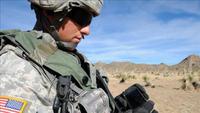-
Why law enforcement officers should earn a degree in homeland security
In a guest column, Dennis Porter, a former law enforcement officer with more than thirty years of experience, argues that it is critical for U.S. national security that members of the law enforcement community return to school to obtain degrees in homeland security; with counterterrorism becoming an increasingly more crucial duty for law enforcement officers, it is imperative that they have the skills and knowledge to effectively combat extremism
-
-
Most affordable online degrees in homeland security
According to a recent study, at $7,300 Fort Hays State University is the best place to earn your online Master’s degree in criminal justice if you are looking for a bargain; last week GetEducated.com, a publisher of online college rankings and reviews, released its rankings for the most affordable online degrees in homeland security, forensics, criminal justice, and security
-
-
Community colleges invest in homeland security education
Since 9/11 community colleges have played an increased role in providing job training to those seeking careers in homeland security, intelligence, and disaster response
-
-
Pace University launches new cybersecurity institute
Last week Pace University announced that it had launched a special institution aimed at helping the United States alleviate the critical shortage of cybersecurity professionals and secure the nation’s data networks
-
-
Senate stalls on easing visa restrictions for highly skilled immigrants
A bill meant to allow more high-skill immigrants from India and China to obtain green cards has been placed on hold by Senator Charles Grassley (R-Iowa) over concerns that it should do more to “protect Americans at home”
-
-
Also noted
G4S Secure Solutions wins award for homeland security training and education | Cumberland and Salem Community College team to offer homeland security degree | University of Maryland promotes cybersecurity education | Government struggles with cybersecurity workforce | Cybersecurity: a varied field
-
-
Sector Report for Tuesday, 6 December 2011: Education Special
This report contains the following stories.
Plus 6 additional stories
-
-
Making counter-hacking cool

NYU-Poly will, for the first time, open cyber security awareness week events on 11-12 November to student guests interested in digital privacy and security — not just the so-called “cyber ninjas” who qualified as national finalists in feats of digital forensics, ethical hacking, and research; the event is expected to attract up to 400 student finalists, professionals, academics, and guests
-
-
New partnership to promote cybersecurity education
There will be a need of more than 700,000 new information security professionals in the United States by 2015; the U.S. Bureau of Labor Statistics estimate that there will be 295,000 new IT jobs created in the United States by 2018 — many of which will require cybersecurity expertise; new partnership focuses on cybersecurity training and education
-
-
Cyber Challenge encourages teen hackers to seek security jobs

In the eyes of the organizers of the Maryland Cyber Challenge and Conference, today’s hacker could be tomorrow’s cybersecurity hero; a recent two-day conference at the Baltimore Convention Center, which ended 22 October 2011, was part career fair, part talent show to give college and high school students an idea of how to turn their interest in computers into high-paying jobs
-
-
Sandia Labs seeking responses to cyberattacks
To address the growing cyber threat, Sandia National Lab is increasing cybersecurity research over the coming year through a new Cyber Engineering Research Institute (CERI) which will coordinate with industry and universities and have a presence on both Sandia campuses in New Mexico and California
-
-
Lockheed Martin hosts 150 Md. students in cybersecurity event
Top performing Science, Technology, Engineering and Mathematics (STEM) high school students from Maryland gathered yesterday at Lockheed Martin’s NexGen Cyber Innovation & Technology Center to explore cyber security careers, education, and to promote safe online practices through a series of lessons and interactive stations
-
-
Securing smartphones in battle

As the military moves to incorporate smartphones on the battlefield, critics worry that the inherent security flaws in the devices could result in major data breaches or cybersecurity attacks on the military’s networks
-
-
Raytheon expanding its commitment to math and science education
Raytheon Company said it is expanding its commitment to math and science education through a $1 million gift that will help extend the national impact of the Museum of Science, Boston’s Engineering is Elementary (EiE) program; in the past five years, Raytheon has committed more than $60 million to MathMovesU, STEM and education programs
-
-
Food safety grant to fund research on preventing food-borne illnesses

A $1.3 million grant to develop a new food-safety training program for government and industry has been awarded by the U.S. Food and Drug Administration (FDA) to the University of California, Davis, School of Veterinary Medicine
-
- All
- Regional
- Water
- Biometrics
- Borders/Immig
- Business
- Cybersecurity
- Detection
- Disasters
- Government
- Infrastructure
- International
- Public health
- Public Safety
- Communication interoperabillity
- Emergency services
- Emergency medical services
- Fire
- First response
- IEDs
- Law Enforcement
- Law Enforcement Technology
- Military technology
- Nonlethal weapons
- Nuclear weapons
- Personal protection equipment
- Police
- Notification /alert systems
- Situational awareness
- Weapons systems
- Sci-Tech
- Sector Reports
- Surveillance
- Transportation
Advertising & Marketing: advertise@newswirepubs.com
Editorial: editor@newswirepubs.com
General: info@newswirepubs.com
2010-2011 © News Wire Publications, LLC News Wire Publications, LLC
220 Old Country Road | Suite 200 | Mineola | New York | 11501
Permissions and Policies
Editorial: editor@newswirepubs.com
General: info@newswirepubs.com
2010-2011 © News Wire Publications, LLC News Wire Publications, LLC
220 Old Country Road | Suite 200 | Mineola | New York | 11501
Permissions and Policies
